A wildfire, bushfire, wild land fire or rural fire is an unplanned, unwanted, uncontrolled fire in an area of combustible vegetation starting in rural areas and urban areas. Depending on the type of vegetation present, a wildfire can also be classified more specifically as a forest fire, brush fire, bushfire (in Australia), desert fire, grass fire, hill fire, peat fire, prairie fire, vegetation fire, or veld fire. Many organizations consider wildfire to mean an unplanned and unwanted fire, while wild land-fire is a broader term that includes prescribed fire as well as wildland fire use (WFU; these are also called monitored response fires).
Wildfires can be characterized in terms of the cause of ignition, their physical properties, the combustible material present, and the effect of weather on the fire. Wildfires can cause damage to property and human life, although naturally occurring wildfires may have beneficial effects on native vegetation, animals, and ecosystems that have evolved with fire. Wildfire behavior and severity result from a combination of factors such as available fuels, physical setting, and weather. Read more
Canada's 2023 wildfires contributed to 87,000 early deaths worldwide, study estimates Live Science - September 12, 2025

Fires burned 71,043 square miles (18.4 million hectares) of Canadian forest that year, about 5% of the total forest in the country. The smoke plumes from the fires heavily impacted the U.S. Northeast and Midwest, and they even wafted across the Atlantic to Europe and northern Africa.
Grand Canyon fire grows into a megafire and creates its own weather. It's not done yet CNN - August 1, 2025
A wildfire in Grand Canyon National Park in Arizona has burned for nearly a month in exceptionally dry, hot weather, growing into the largest wildfire of the year so far in the continental United States, according to the National Interagency Fire Center. The Dragon Bravo fire, which has closed the park’s North Rim, grew to more than 114,000 acres on Saturday. Its size is expected to increase in coming days because of dry, warm weather. The fire was 11 percent contained as of today, according to InciWeb, a government site that tracks wildfires.

Wildfire destroys a historic Grand Canyon lodge and other structures CNN - July 14, 2025
A rapidly moving wildfire north-west of the Grand Canyon National Park in Arizona has forced the closure of the park's North Rim and triggered evacuation orders for area residents. BBC - July 12, 2025
Part of Grand Canyon evacuated as wildfire spreads
PhysOrg - July 12, 2025
Smoke from Canadian fires reaches Europe: EU climate monitor PhysOrg - June 3, 2025

Heavy smoke from intense wildfires in Canada has reached northwestern Europe, the European Union's climate monitoring service said on Tuesday. The huge plumes are at very high altitude and do not pose an immediate health risk, it said in a statement. Smoke originating from the wildfires in the Canadian provinces of Manitoba and Saskatchewan has been transported across the Atlantic. Satellites tracked the smoke in mid-May, with some plumes reaching as far east as Greece and the eastern Mediterranean.
Wildfires rage outside Jerusalem, forcing evacuations and road closures CNN - May 1, 2025

This is perhaps the largest fire ever in the country, Jerusalem District Fire Department Commander Shmulik Friedman told reporters. He warned that winds in excess of 60 miles an hour are expected “in the near future,” dramatically increasing the risk of the fires.
The FDNY extinguished a brush fire Saturday afternoon in Marine Park near Gerritsen Beach Park, Brooklyn Long Island News - March 8, 2025

Wildfires intensifying more due to changes in vegetation and humidity than to lightning, supercomputer simulation finds PhysOrg - February 12, 2025

Extreme fire seasons in recent years highlight the urgent need to better understand wildfires within the broader context of climate change. Under climate change, many drivers of wildfires are expected to change, such as the amount of carbon stored in vegetation, rainfall, and lightning strikes.


Wikipedia: 2025 California Wildfires
Our Relationship With Fire Is Creating The Burning Equivalent of an Ice Age Science Alert - January 23, 2025
Los Angeles is burning, but it isn't alone. In recent years, fires have blasted through cities in Colorado, the southern Appalachians and the island of Maui, along with Canada, Australia, Portugal, and Greece. What wasn't burned was smoked in. This is another case of a future not only dire but strange, without a narrative to join past to present and an analog for what is to come.
Wildfires Surged During Past Climate Shifts, Ancient Antarctic Ice Reveals Science Alert - January 9, 2025
Tiny bubbles trapped in ancient Antarctic ice have revealed surges in global wildfire coinciding with signs of abrupt climate change. While temperature variations, changes in tropical rainfall, and spikes in methane are known traits of climate shifts, until now, fires had not been part of the equation.
Smoky Smell Engulfs New York City After Fires in Brooklyn and New Jersey NY Times - November 9, 2024

New Yorkers encountered an unsettling smell on Saturday, a day after fires broke out in Prospect Park and across the Hudson River.
Giant wildfires can create their own weather. Here's how. Live Science - August 2, 2024
Wildfire blowups, fire whirls, towering thunderstorms: When fires get large and hot enough, they can actually create their own weather. In these extreme fire situations, firefighters' ordinary methods to directly control the fire don't work, and wildfires burn out of control. Firefighters have seen many of these risks in the enormous Park Fire burning near Chico, California, and other wildfires in summer 2024.
Wildfire smoke exposure linked with higher dementia risk Medical Express - August 1, 2024

The risk of dementia with wildfire smoke was notably stronger, even with less exposure, than that associated with other sources of air pollution, researchers found.
Canada Wildfire Smoke Crossed The Atlantic Ocean ... In September - September 27, 2023

Canadian wildfire smoke has been pulled across the Atlantic Ocean as far east as Ireland, a strange sight for late September during the country's most prolific season of wildfires on record. Satellite imagery seemed to be fairly typical for September over the Atlantic Ocean. A pair of storms - one of which was named Storm Agnes by the U.K. Met Office - were lined up headed for Ireland and the U.K. However, as the image below showed, there were also plumes of smoke from Canada across the ocean toward Ireland. The smoke was particularly dense over Nova Scotia, New Brunswick, Newfoundland, even parts of Downeast Maine.
2023 Hawaii Wildfires Wikipedia
In early August 2023, a series of wildfires broke out in Hawaii predominantly on the island of Maui. The wind-driven fires prompted evacuations, caused widespread damage and more. The death toll has become the deadliest in the United States since the Cloquet fire of 1918.
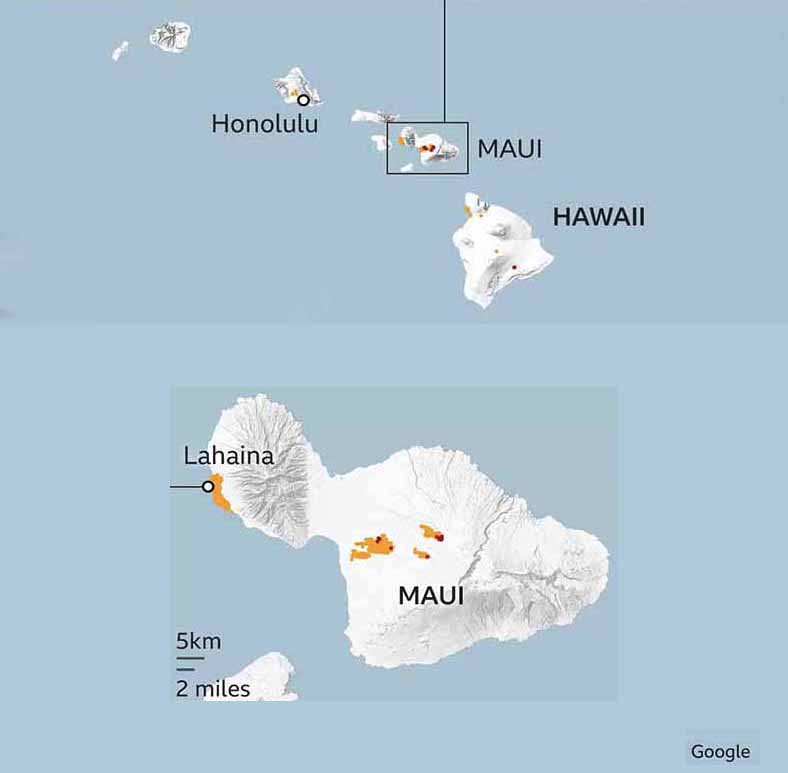
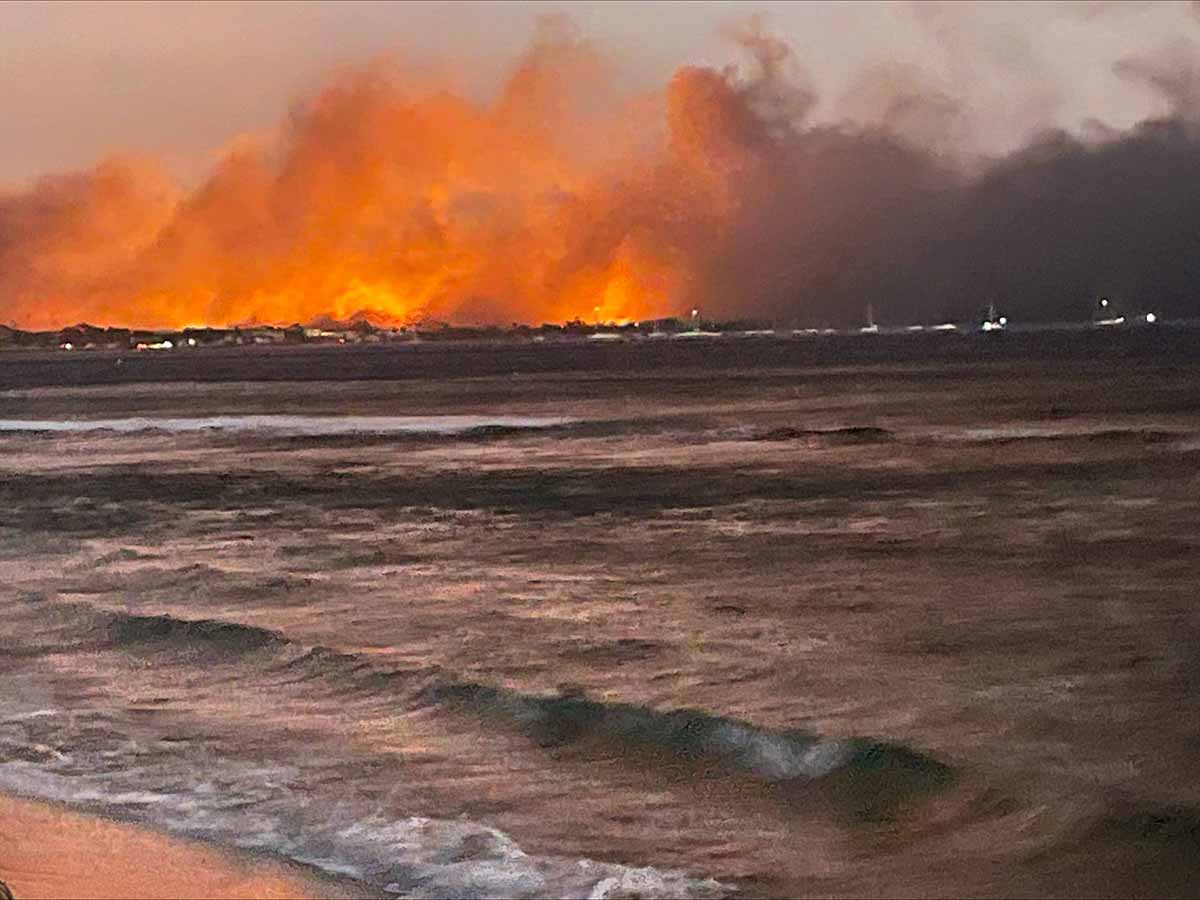
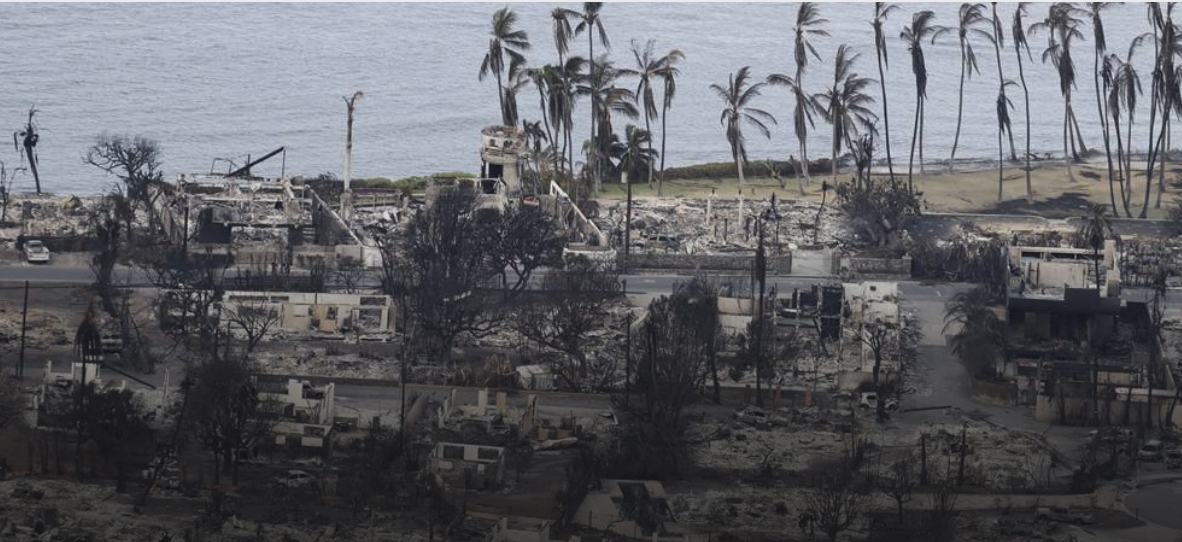
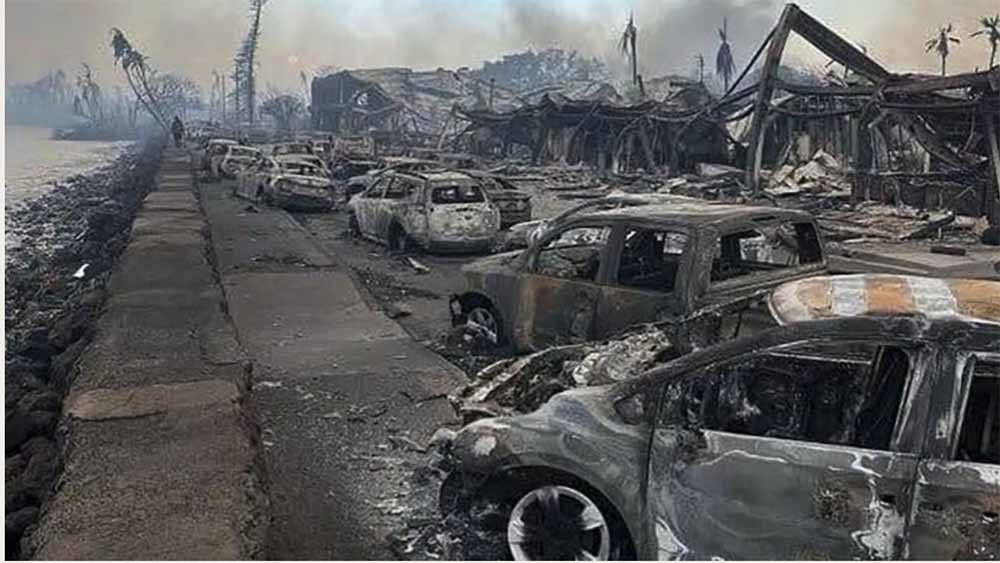
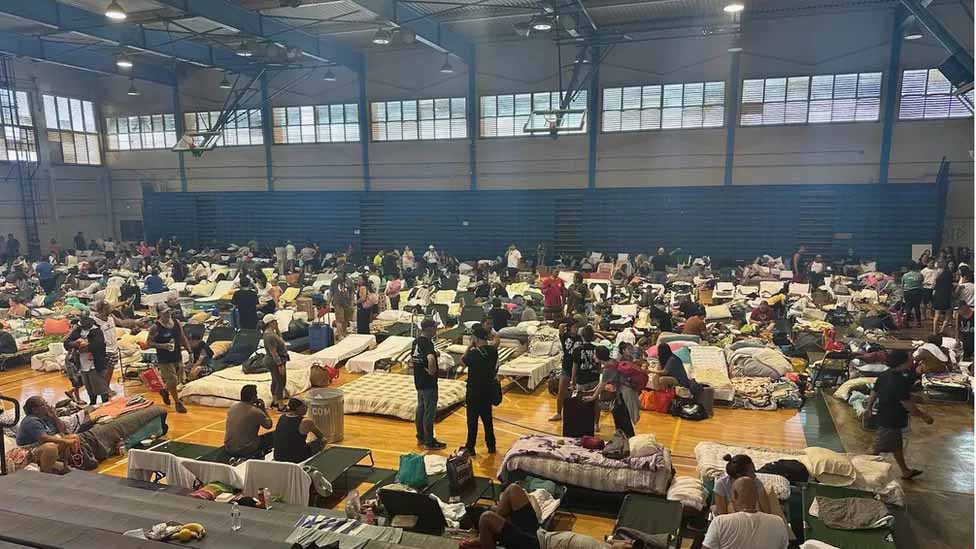
Joshua trees burn, massive wildfire threatens to forever alter Mojave Desert PhysOrg - August 2, 2023
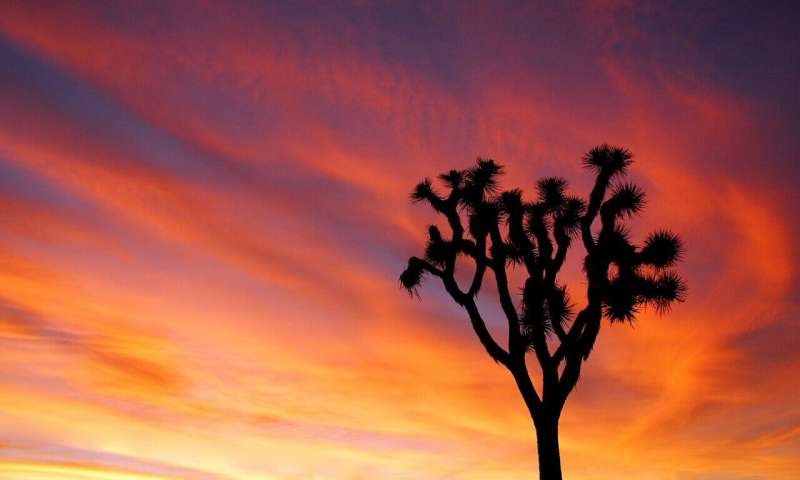
California's largest wildfire of the year has grown to over 80,000 acres in the desert around the Nevada border, burning primarily in the national preserve. Aided by brief rain, crews made the first real inroads against the blaze. Recovery is really not a meaningful term in the desert because of the global climate changes.
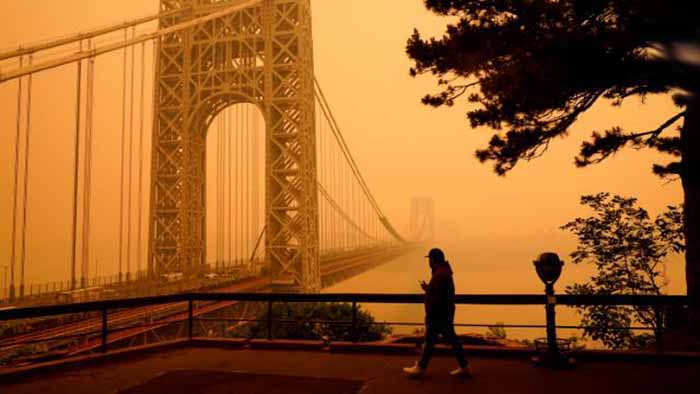

Canadian Wildfires Create Orange Haze and Stunning Sunsets - Rayleigh Scattering
Raging Canadian Wildfires Now in Nova Scotia Earth Observatory (NASA) - May 29, 2023
Smoke from Canadian fires is pouring into the US and could linger for days
CNN - May 19, 2023
Like Hell On Earth: Chemical Reactions Fuel The Smoking Hills Of Canada IFL Science - May 15, 2023
Wildfire Destruction in The Western US Has Doubled in Just 10 Years Science Alert - February 2, 2023
Another above-average wildfire season for 2022. How climate change is making fires harder to predict and fight. PhysOrg - December 30, 2022
Proliferating wildfires poison public health across the country PhysOrg - October 18, 2022
The oldest evidence of wildfire has been identified in South Wales BBC - June 27, 2022
Mythologized, memorialized then forgotten: A history of Australia's bushfire reporting PhysOrg - January 18, 2022
Fire near Jerusalem forces village evacuations PhysOrg - August 17, 2021
Spain sizzles in crushing heat as fires blaze PhysOrg - August 16, 2021
For The 1st Time In Recorded History, Smoke From Wildfires Reaches The North Pole NPR - August 11, 2021
Thick smoke over Athens as suburbs battle wildfires PhysOrg - August 3, 2021
'A Chronic Lack of Fire': The Paradox Fueling Megafires in The US Science Alert - August 3, 2021
91 large wildfires burning across the US CNN - August 2, 2021
100 blazes have swept Turkey in the past week CNN - August 2, 2021
Smoky Skies Prompt 911 Calls in Connecticut; State Issues Warning NBC - July 27, 2021
Wildfire smoke in New England is 'pretty severe from public health perspective' PhysOrg - July 27, 2021
Firefighters battle California blaze generating its own climate PhysOrg - July 27, 2021
Possible future for Western wildfires: Decade-long burst, followed by gradual decline PhysOrg - July 27, 2021
Thousands of animals perish, 1,500 people evacuate as massive wildfires ravage Sardinia, Italy Watchers - July 27, 2021
Society is right on track for a global collapse, new study of infamous 1970s report finds Live Science - July 20, 2021
Greece wildfires: Blaze forces evacuations on island of Samos BBC - August 26, 2019
In pictures: Wildfires ignite across Indonesia BBC - August 23, 2019
Wildfires rage in the Amazon CNN - August 22, 2019
The world is experiencing unprecedented flooding, record breaking temperatures, droughts, landslides, ice quakes, fire tornados, heat domes and other extreme weather conditions that are part of the closure of the simulation of reality.
CNN July 22, 2021 -- Wildfires are raging in unexpected parts of the globe as hot temperatures and dry conditions turn rarely burned places into tinderboxes. Near the Russian Siberian city known as the coldest in the world, fires have consumed more than 6.5 million acres since the start of the year. Most of Europe, the Western US, southwest Canada and some regions of South America experienced drier-than-average conditions in June, creating prime conditions for new blazes and making ongoing fires harder to battle. In California, Pacific Gas and Electric announced it will bury 10,000 miles of its power lines to reduce the risk of starting any more blazes. Equipment belonging to the nation's largest utility has played a role in sparking some of the deadliest wildfires in California.
Ellie reporting from Bay Ridge Brooklyn
Wildfire smoke spreads across US in striking images from space Live Science
Massive wildfires in US West bring haze to East Coast PhysOrg
Video: Smoke From Western Wildfires Reaches Northeast Weather.com
Wildfire smoke from the West's massive blazes stretches all the way to the East Coast CNN